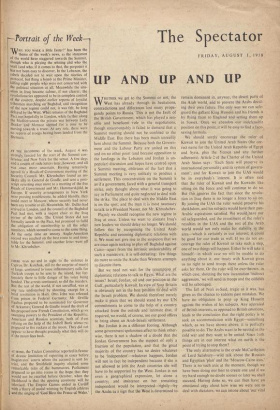—Portrait . of the Week— , W ILL YOU WALK a little
faster?' has been the theme of the week's news, as the statesmen of the world have staggered towards the Summit, though who is playing the whiting and who the snail (and who, if it comes to that, the porpoise) it has not been easy to discover. In the Lebanon, the rebels decided not to wait upon the niceties of protocol, but flung a bomb at the Prime Minister, killing eight people who were not concerned with the political situation at all. Meanwhile the situ- , ation in Iraq became calmer, if not clearer; the revolutionaries appeared to be in complete control of the country, despite earlier reports of loyalist tribesmen marching on Baghdad, and recognition of the new regime could not, it was felt, be long delayed by the West. What remains of the Baghdad Pact met hopefully in London, while farther along the Mediterranean the private war between Lady Docker and Monaco seemed for a time to be moving towards a truce. At any rate, there were no reports of troops having been landed from the Shemara.
*
AT THE, BEGINNING of the week, August 4 was strongly 'fancied for the start of the Summit con- ference, and New York for the venue. A few days and a couple of rude letters later, however, and all was once more uncertain. Having tentatively agreed to a Heads-of-Government meeting of the Security Council. Mr. Khrushchev found an un- likely ally in General de Gaulle, and sent a post- script reverting once more to a meeting of the five Heads of Government and Mr. Hammarskjold, in Europe. If security arrangements in New York were proving troublesome, he added blandly, they could meet in Moscow, where security had never been any trouble at all. Meanwhile, Mr. Dulles had arrived in London, and the council of the Baghdad Pact had met, with a vacant chair at the Iraq corner of the table. The United States did not formally accede to the Pact, but promised to fulfil the obligation of membership to all the other members, which seemed to come to the same thing. At the same time an uneasy Anglo-American accord was reached on the best route to and time- table for the Summit, and another letter went off to Mr. Khrushchev.
THERE WAS no end in sight to the violence in Cyprus. Dr. Kutchuk, still (to the surprise.of many) at large, continued to'issue inflammatory calls for Turkish troops to be sent to the island, but for- tunately there is little danger of his voice being heeded. The arrests continued; so did the murders. But the rest of the world, if not unruffled, was at any rate undisturbed by shooting, except for a brief revolution in Haiti. Otto John was released from prison in Federal Germany; Mr. Orville Faubus prepared to be nominated for Governor of Arkansas; General de Gaulle issued the draft of his proposed new French Constitution, which gives sweeping powers to the President of the Republic; American and Russian scientists, both of them relying on the help of the Jodrell Bank telesecne, prepared to fire rockets at the moon. They did not appear to have thought precisely what they will do if the moon fires back.
*
AT HOME, the Tucker Committee reported in favour of drastic limitation of reporting in cases before magistrates' courts where the accused is sent for trial, and the Smithfield inquiry elicited some remarkable tales of the bummarees. Parliament Prepared to go into recess in the hope that they would not be recalled before October, when the likelihood is that the opening ceremony will be televised. The Empire Games ended in Cardiff with a flurry of medal-winning by English athletes and the singing of 'God Bless the Prince of Wales.'






























 Previous page
Previous page